[bannerTop]
Welcome to our Bookness Virus removal guide. The following instructions will aid you in removing the unwanted software from your PC.
The following article will provide its readers with information regarding a piece of software known as Bookness Virus which, due to its intrusive and irritating behavior and some rather unpleasant traits that it possesses, is regarded as potentially unwanted. Most complaints associated with Bookness Virus are regarding the fact that it tends to get added to the user’s Firefox, IE, Edge or Chrome browser and introduce various unwanted changes to it without being given permission to do so. Most of the time, those changes include a replacement of the default homepage and search engine of the browser and possibly an addition of some new and obscure toolbar. Some users also report that the unpleasant program might cause redirects to random websites some of which could potentially have shady and suspicious contents. All of the aforementioned symptoms point towards the fact that Bookness Virus is a program of the Browser Hijacker type, which is how we will refer to it from now on. Probably, many of the visitors of this page have come here because the pesky program has already been installed on their computers. If that is your situation, we are happy to inform you that there is a removal guide down below, which will show you how you can quickly and effectively uninstall the irritating Hijacker and ensure that it has removed for good. The guide manual is free and will cost you nothing to complete it, so do not hesitate to use it to get rid of the unwanted software once you’ve finished reading this article.
Browser Hijackers and online advertising
Browser Hijackers like Bookness Virus are basically nothing but software tools used for earning money through a variety of different Internet marketing methods, a lot of which can be rather aggressive. Users hardly ever benefit from this type of software since programs like these are seldom aimed at actually providing the regular customer with some sort of actual practical feature. This, however, is not to say that Hijacker developers do not try to promote their products as being helpful and useful – quite the opposite. Oftentimes, Browser Hijacker programs are said to benefit the user by boosting their PC’s performance, making their online experience more pleasant and productive or improving the overall security of the computer. Sure, there might be exceptions where a Hijacker-like program would actually deliver on its promise of being helpful, but you ought to keep in mind that this is normally not the case. Most Hijackers are made to solely meet the needs of their creators without having much concern regarding the users themselves.
Harmful Hijackers?
Many researches see Browser Hijackers as a type of malware and it is not difficult to see why. After all, programs like Bookness Virus tend to mess with the user’s Internet and browser settings without even asking for permission to do so. However, something that many users fail to understand is that there is a significant difference between real computer viruses (for example, Ransomware, Trojans, Spyware, Worms) and potentially unwanted programs such as the ones we are currently talking about. Most Hijackers aren’t actually inherently malicious and are normally not able to cause any direct harm to the computer’s system or the files that are stored on it. However, due to their heavy interference with the PC’s internet and browser settings, Browser Hijackers like Bookness Virus have the potential to make the computer more vulnerable and susceptible to virus attacks. For instance, the page redirects that some Hijackers tend to trigger could, as we already mentioned, open up websites with shady and potentially harmful contents. Also, a lot of Hijackers tend to mess with the Registry of the computer, which can further compromise its system’s security. All in all, if you do not want to risk having your machine attacked by some malicious and harmful Trojan horse or some nasty Ransomware virus, it is advisable that you remove Bookness Virus from your PC. The sooner you do it – the better.
Keeping Browser Hijackers at bay
One of the most important things that you need to learn regarding this kind of potentially unwanted software is how you can avoid having such programs installed on your computer. The next tips and rules will not only help you prevent any Hijackers from getting inside your PC, but will also improve the overall security of your computer as long as you remember to apply them.
- First and foremost, keep in mind that your online behavior is crucial when it comes to keeping your PC safe. For example, if you tend to visit a lot of obscure and unreliable websites, you drastically increase the chances of landing some unwanted and potentially hazardous program.
- Various shady social engineering techniques are commonly used as a way to spread Browser Hijackers. Do not fall for any sketchy online offers, ads or fake browser warnings, since those can turn out to be direct download links for all sorts of undesirable software.
- Additionally, keep in mind that Hijackers can also be sent to your e-mail or any of your social network accounts via spam messages that carry links or file attachments. If you receive a new message that looks like it could be spam, be sure not to open it regardless of who the sender is unless you can be hundred percent sure that it can be trusted.
- Anti-malware tools can greatly help you against undesirable programs like Bookness Virus. Consider equipping your computer with such a program if you do not already have one.
- Before you launch the installation of a new program that you want to have on your computer, take a careful look at its setup menu and see if there are any optional installs. Program-bundling is commonly used for distributing Hijackers which is why you must always be on your guard when installing new software. If there are indeed added applications that are optional, try looking them up and if the results are not satisfactory and you think that the bundled install could be some form of unwanted program, remove the tick from the box next to it so that it doesn’t get installed along the main program.
SUMMARY:
| Name | Bookness |
| Type | Browser Hijacker |
| Danger Level | Medium (nowhere near threats like Ransomware, but still a security risk) |
| Symptoms | Browser Hijackers normally introduce undesirable changes to the user’s browser, which is what usually gives them away once they get installed on the PC. |
| Distribution Method | E-mail and social network spam messages, bundling the Hijacker to other free programs or distributing it via ads and web offers integrated within the pages of different unreliable websites. |
Bookness Virus Removal
I – Safe mode and revealing hidden files
II – Uninstallation
[bannerMiddle]
- Use the Winkey+R keyboard combination, write Control Panel in the search field and hit enter.

- Go to Uninstall a program under Programs.

- Seek the unwanted software, select it and then click on Uninstall
If you are unable to spot Bookness Virus, search for any unrecognized programs that you do not remember installing on your PC – the unwanted software might disguise itself by going under a different name.
III – Cleaning all your browsers
- Go to your browser’s icon, right-click on it and select Properties.

- Go to the Shortcut tab and in the Target make sure to delete anything written after “.exe”.

- Now, open your browser and follow the instructions below depending on whether you are using Chrome, Mozilla or IE.
- Chrome users:
- Go to your browser’s main menu located in the top-right corner of the screen and select Settings.
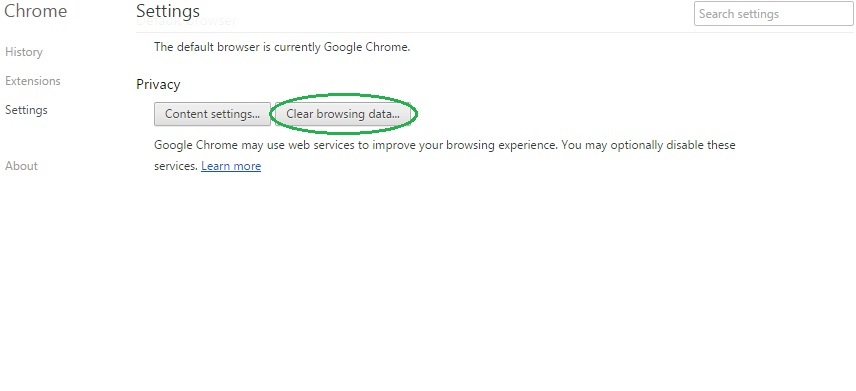
- Scroll down, click on Show Advanced Settings and then select Clear browsing data. Just to be sure, tick everything and clear the data.
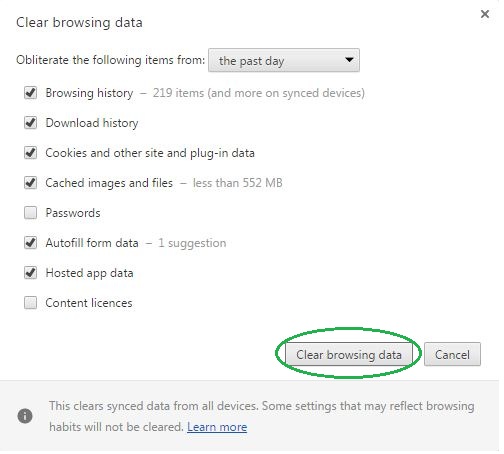
- Now, in the left pane, go to Extensions and look through all extensions that are integrated within your browser. If you notice any suspicious add-on, disable it and then remove it.
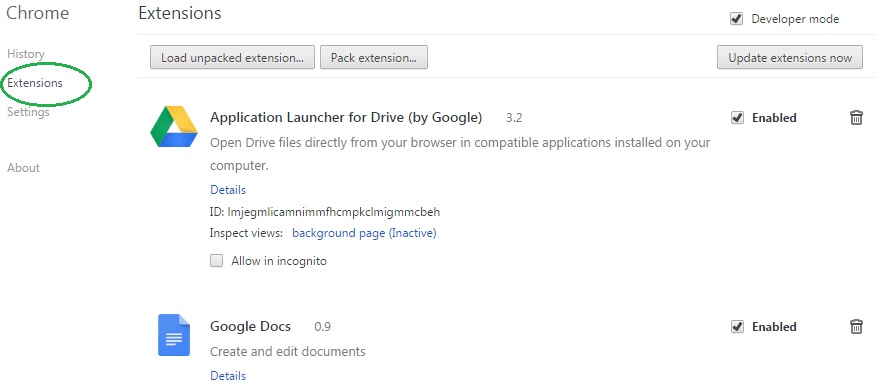
- Firefox users:
- Similarly to Chrome, go to the main menu and select Add-ons and then Extensions.
- Remove any suspicious browser extensions that you may have even if they do not have the name Bookness Virus on them.
- IE users:
- Go to Tools and select Manage add-ons.

- Click on all add-on types from the left pane and check if there is anything suspicious in the right panel. In case you find anything shade, make sure to remove it.
IV – Removing Shady processes
[bannerMiddleSecond]
- Go to your start menu, type Task Manager in the search field and from the results open View running processes with Task Manager.

- Thoroughly look through all processes. The name Bookness Virus might not be there, but if you notice any shady looking process that consumes high amounts of memory it might be ran by the unwanted program.
- If you spot the process ran by Bookness Virus, right-click on it, open its file location and delete everything in there. Then go back to the Task Manager and end the process.

V – DNS check
- In the start menu search box write View Network Connections and open the first result.
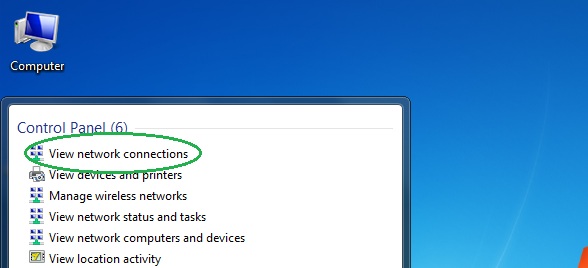
- Right-click on the network connection you are using and go to Properties.

- Select Internet Protocol Version (TCP/IPv4) and click on Properties.

- If Obtain DNS server addresses automatically is not checked, check it.
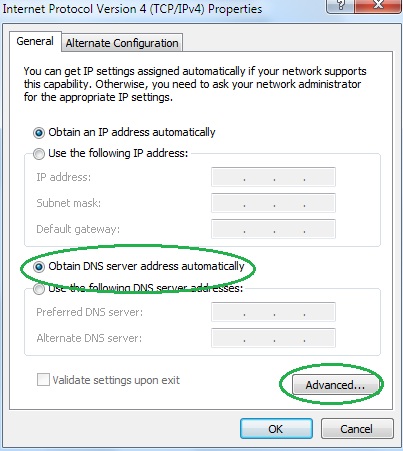
- Go to Advanced and select the DNS If there is anything in the DNS server addresses field, remove it and click OK.

- Click OK on the rest of the opened windows.





Leave a Reply